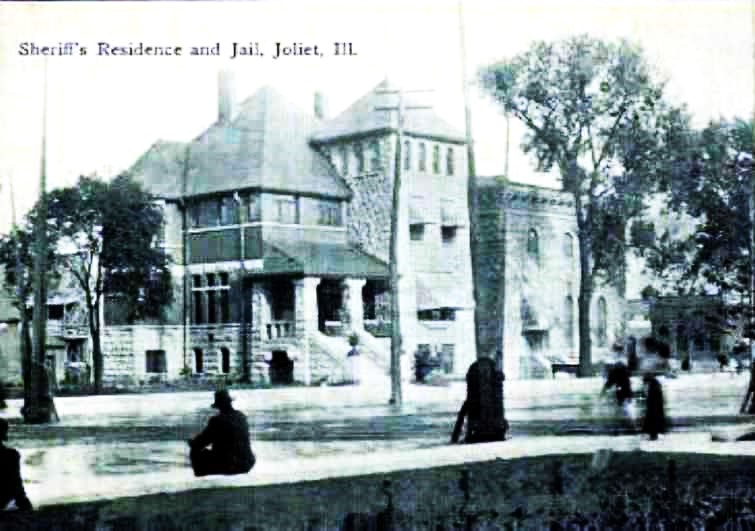The noble Sheriff Noble, good guy or …?

By Sandy Vasko
It is a story that is as old as society: A good guy, with his heart in the right place, is brought down by his love of money, or was it love of his fellow man? Today’s story is from the 1870s, and the subject is Warren Noble.
Warren Noble was the son of Royal and Ellen Noble, on a farm family near Wilmington. At age 19 in 1860, his occupation is listed as farmer. But apparently, he was mechanically inclined, because by 1870, we find him living in Braidwood, working at the mines as an engineer.
Whether he was not making enough working for the mines, or he wanted more steady occupation, in 1873, we find Warren working as a deputy sheriff under Sheriff G. S. Arnold in Joliet.
In one incident, Noble had gone out to the Mernaugh farm to levy some property to satisfy a court judgment. He spotted some good-looking hogs, but Mrs. Mernaugh spotted him. We read in the October 25, 1873 Wilmington Advocate:
“When she saw the Sheriff’s eye on several fine porkers, she thought the time for action had come; so, seizing a three tined pitchfork, she ‘went for’ Mr. Sheriff, putting him on a line of retreat. Not desiring to be ‘forked over’ in that manner, Noble drew his revolver and told Mrs. M. To ‘stopa leedle’ or he would put daylight through her. She complied. While this was going on the children had turned the hogs loose. The fugitive porcine were soon overtaken, however, and while the Sheriff and party drove them one way, the Mernaughs tried to drive them in an opposite direction. Result – the plucky Sheriff kept possession of the property, and then secured Mernaugh, who was bound over for trial.”
Noble was also called in to find escaped prisoners. We read on March 12, 1875: “While Marshal Scheidt, of Joliet and a Springfield police officer, were en route from Springfield to Joliet with a prisoner on the early train on Monday, they fell asleep. Their prisoner, who is a noted hotel thief named Robert Sherman, alias Daly, seized the opportunity and jumped from the train – then making 30 miles an hour – at a point one mile west of this city. Sherman was traced to this city (Wilmington), thence to Forked Creek, thence some 14 miles toward Kankakee, when he was captured by Marshal Scheidt and Deputy Sheriff Noble, of this city.”
In 1876, Noble was made Sheriff of Will County. Around that time, he moved back to Wilmington. The following year, he had to return to Braidwood in his official capacity during the great coal strike. We read on April 19, 1877 in the Joliet Sun: “The Braidwood trouble – Sheriff Noble returned from Braidwood this (Saturday) morning, and reports everything quiet so far. He has stationed seven deputies in different portions of the town, and will do all in his power to keep the peace.”
Having worked in the mines himself, he must have been sympathetic to the striking miners because we read in June of 1877: “Sheriff Nobles has donated 5 dollars (about $141 today) to the miners’ relief fund.” But sympathy wasn’t enough. We read one month later: “Sheriff Noble has acknowledged his inability to enforce any authority in Braidwood. He surrenders his power to the mayor of that city.”
And when push came to shove, he couldn’t stand up to his former friends. We read: “Sheriff Noble and a posse numbering 16 men alighted from the cars in Braidwood; they were met by what might be termed armed resistance. The sheriff himself narrowly escaped being shot. He was informed by the mayor that his posse would not be tolerated there under any circumstances, and that their lives would be in peril if they did not at once depart. The sheriff and his party took the hint and departed.”
Certainly, Warren Noble earned his pay as Sheriff, but unfortunately, he got more than that. On March 1, 1878 we read: “Our community was thrown into considerable excitement on Monday evening upon receiving the intelligence that Sheriff Noble had been forced to resign by his bondsmen, they having found official crookedness in his accounts, showing a deficit of some $3,500 (about $109,000 today).”
As the Joliet Sun says: “And of this large sum Mr. Noble is said to have nothing left. How, when and where he has squandered it, we leave others to tell, suffice it to say that it is squandered.”
And what did Sheriff Noble do with the money? I have a theory. In September of 1877, while the strike was still going on, we read the following about the attitude of the Braidwood miners towards Noble:
“A generous heart covereth a multitude of sins. Though the men of Braidwood are firm in their belief that Sheriff Noble has overstepped his duty here, they are free to acknowledge that his many acts of kindness and generosity during the past five months, denotes a generous heart.”
Did he spend it to help his old miner friends? We will never know. But we do know that he was never indicted and went on to live a long happy life as a father of 7 children, working as a stationary engineer in Joliet.